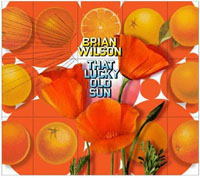
Album review: Brian Wilson – That Lucky Old Sun
 I’ll admit it – I was pretty sure that SMiLE represented the last creative gasp of Brian Wilson, and that with its completion the book was effectively closed on one of pop’s most creative and troubled minds. But here comes That Lucky Old Sun, showing me just how wrong I was. Now in his mid 60s, Wilson still seems to be capable of writing and arranging music with the creativity and vitality of a musician half his age.
I’ll admit it – I was pretty sure that SMiLE represented the last creative gasp of Brian Wilson, and that with its completion the book was effectively closed on one of pop’s most creative and troubled minds. But here comes That Lucky Old Sun, showing me just how wrong I was. Now in his mid 60s, Wilson still seems to be capable of writing and arranging music with the creativity and vitality of a musician half his age.
That’s not to say That Lucky Old Sun (inspired by Louis Armstrong’s rendition of the 1940s chestnut) is perfect, or even that it rivals Wilson’s best work with the Beach Boys. But there are more than a few flashes of the genius here that have enabled him to continue to draw on a vast reservoir of critical and fan good will. It’s an album that sounds totally out of time (it could very well have been written in 1964 and stored in a vault), but is by no means dated.
What struck me immediately is how the album felt polished and warm and accessible at the same time. Wilson may not have that angelic falsetto anymore, and years of copious self-medication has given his speech an audible slur, but his production sense is as keen as ever. That’s clear from the start, when the tight and poppy arrangement of “Morning Beat” sent my foot a-tappin’.
Lyrically and musically That Lucky Old Sun is a concept record, reveling in the warm glow of 1950s and 60s southern California. Those halcyon days may now only exist in the memories of some, but if anyone can keep the endless summer going Brian Wilson can. Most of the album’s first half contains one minor pop treasure after another, “Good Kind of Love”, “Forever She’ll Be My Surfer Girl”, and the aforementioned “Morning Beat” being the best of the bunch. The fact that it sounds completely effortless and non-contrived is the icing on the cake.
Credit for all this must assuredly also be given to Wilson’s supporting cast, particularly band member and co-writer Scott Bennett, who have been helping Wilson to realize his musical visions for many years.
The only real missteps here are the handful of spoken-word narratives sprinkled throughout the album. While they’re interesting, they’re a tad awkward and really don’t add much to the album (of note is that they were written by longtime Wilson collaborator Van Dyke Parks, who thankfully avoids the ultra-flowery prose he’s been known to indulge in). Same goes for the brief snippet of “Can’t Wait Too Long”, which is a long-lost Beach Boys track and pales in comparison to the original.
 While the ebullience of the album’s first portion is infectious and winning, where Wilson really shines is on the slightly more contemplative latter half. The ghosts of his troubled past are confronted on “Oxygen to the Brain” in lines like “I cried a million tears/I wasted a lot of years/life was so dead” and “How could I have got so low/I’m embarrassed to tell you so/I laid around this old place/I hardly ever washed my face.”
While the ebullience of the album’s first portion is infectious and winning, where Wilson really shines is on the slightly more contemplative latter half. The ghosts of his troubled past are confronted on “Oxygen to the Brain” in lines like “I cried a million tears/I wasted a lot of years/life was so dead” and “How could I have got so low/I’m embarrassed to tell you so/I laid around this old place/I hardly ever washed my face.”
But that’s just a setup for the gut-punch of “Midnight’s Another Day”, a confessional, piano-driven ballad as emotionally naked as “‘Til I Die” (“Took the dive, but couldn’t swim/A flag without the wind”). After a brief reprise of the album’s theme, the album closes on a pair of high notes. First is the rollicking and uplifting “Goin’ Home”, and then the gorgeous and aching “Southern California”.
On the second, Wilson recalls his departed brothers Dennis and Carl (who died in 1983 and 1998, respectively): “I had this dream/singing with my brothers/in harmony/supporting each other/tail winds whisping down the Pacific coast/surfin’ on the air/heard those voices again.” To hear the normally reserved Wilson sing those words was sad and beautiful at the same time.
Had Brian Wilson not taken the Beach Boys down the more challenging musical path forged by works like Pet Sounds and SMiLE, That Lucky Old Sun would’ve fit right into their catalog. And whereas I was happy for Brian when he finally issued SMiLe in 2004, That Lucky Old Sun just makes me happy.
